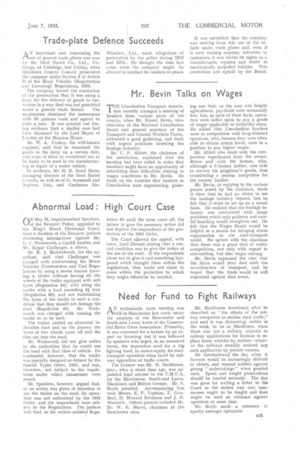Abnormal Load : High Court Case
Page 35

If you've noticed an error in this article please click here to report it so we can fix it.
ON May 31, Superintendent Spenlove, of the Newport Police, appealed to the King's Bench Divisional Court, from a decision of the Newport justices disnaissing informations against Mr. G. C. Wadsworth, a Cardiff haulier, and Mr. Edgar Challenger, a driver.
Mr. R. J. Micklethwait, for the appellant, said that Challenger was charged with contravening the Motor Vehicles (Construction and Use) Regulations by using a motor tractor drawing a trailer without having all the wheels of the trailer equipped with soft tyres (Regulation 54); with using the trailer with a load exceeding 6f tons (Regulation 60), and not maintaining the tyres of the trailer in such a condition that they should not damage the road (Regulation 64). Mr. Wadsworth was charged with causing the trailer so to be used.
The trailer carried an abnormal indivisible load and on the journey the tyres of two wheels came all and the rims cut into the road.
Mt. Wadsworth did not give notice to the authorities that he would use the road with that class of vehicle. He contended, however, that the trailer was specially designed as defined by the Special Types Order, 1931, and was, therefore, not subject to the regulations under which summonses were issued.
Mr. Spenlove, however, argued that, as no notice was given of intention to use the trailer on the road, its operation was not authorized by the 1931 Order, and the respondents were subject to the Regulations. The, justices held that, as the vehicle satisfied Regu
lation 64 until the tyres came off, the failure to give the necessary notice did not deprive the respondents of the protection of the 1931 Order.
The Court allowed the appeal, with costs, Lord Hewart stating that a cmcial condition was to give the notice of the use of the road. If the respondents chose not tb give it and something happened which brought them within the regulations, they could not claim to come within the protection to which they might otherwise be entitled.




























































































